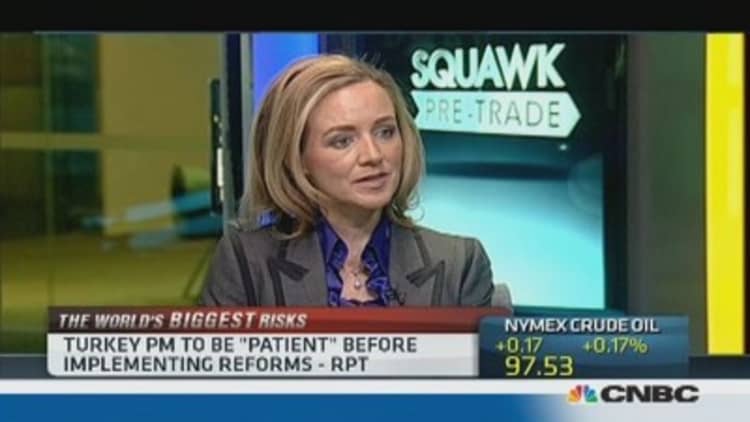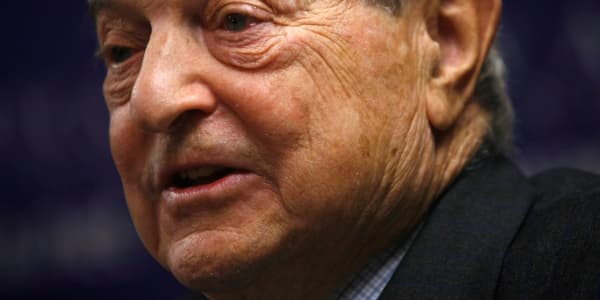Violent clashes broke out in Kiev on Tuesday as protesters confronted police near to the Ukrainian capital's parliament building.
Protesters torched three police trucks with petrol bombs before being forced back by police firing rubber bullets, according to reports by Reuters news agency. Several thousand people were involved in the clashes, which the agency said was the worst violence in more than three weeks. Agence France Presse, citing opposition medics, said at least three people had been killed and 150 injured, some seriously in the clashes.
Interfax-Ukraine news agency reported that flares and flash bangs had been hurled at police and protesters were preparing to throw paving stones, moving them closer to police cordons. It added that activists had forced open the entrance door to the ruling Party of Regions' office, located on Lypska Street in the center of Kiev, and entered the building's courtyard.
(Read More: Yanukovich accepts resignation of PM amid fears of civil war)
"Protesters destroyed an iron fence and set fire to one of the cars parked in the yard...when another two cars emerged from the yard, the activists attacked them with baseball bats, but the cars drove away," it said in a report on its website.
"The protesters also surrounded several people who walked out of the building and seized files with documents from them."
Opposition leader Vitali Klitschko, a former boxing champion, called for Viktor Yanukovych's embattled government to hold early presidential and parliamentary elections at a press briefing in parliament, that was later posted on his party's website.
"I appeal to the President of Ukraine as he exclusively is accountable for what is happening," he said. "Announce early presidential and parliamentary elections! Do it! This will be the way out."
(Read more: Europe must not abandon Ukraine: Opposition leader)
Protesters have been camped on Kiev's Independence Square and surrounding streets since December after the Ukrainian president's surprise decision in December not to sign an association agreement with the European Union. This would have strengthened political, trade and economic ties between the 28-nation union and Ukraine – in favor of closer ties with Russia.
Instead the Ukrainian government has turned to Russia, opting for President Vladimir Putin's offer of $15 billion of aid. Russia solidified its help for Ukraine with a fresh cash injection of $2 billion on Monday to support its heavily indebted economy, according to Reuters.
This extra cash had little effect on the nation's currency, however, which is in free-fall, with the dollar appreciating 7.4 percent against the volatile hryvnia since the start of the year. The dollar is currently at 5-year highs against the currency. Stocks on the nation's UAX also lost ground, on Tuesday, with losses of 2.35 percent by early afternoon. Meanwhile, the country's 5 year credit default swaps - the price it costs to insure its debt over a 5-year period - reached highs on Friday not seen since December 2009.

(Read More: Doubts over Renzi's 'ambitious' reforms for Italy)
Timothy Ash, the head of emerging market research at Standard Bank, believes that any forthcoming bailouts from Russia are still dependent on Yanukovych being able to get a Russian-friendly prime minister approved and secured in the post over the next few days. Former prime minister Mykola Azarov tendered his resignation in late January in an effort to calm violent street protests.
"This is like groundhog day," Ash said in a research note on Tuesday morning, regarding the fresh protests. "(There's) not much evidence of compromise and conciliation now."
Ash said that Serhiy Arbuzov, who was Azarov's first deputy, and stepped in as interim prime minister, is most likely to be nominated as the next premier. He added that if he gets the nod, it would be a clear signal that Yanukovych is consolidating his grip over the ruling Party of Regions, with Arbuzov being close to the Yanukovych family.
Moscow seems now to be putting all its eggs in the Yanukovych basket, he said, and banking on Arbuzov holding the line against the push for closer ties to Europe. Ash believed the credit Russia has so far extended to Ukraine had not really "touched the sides" and a poor current account deficit, large external financing requirement, low foreign exchange reserves and pressure on the stock exchange meant that its debt load would only get worse.
—By CNBC.com's Matt Clinch; Follow him on Twitter @mattclinch81





